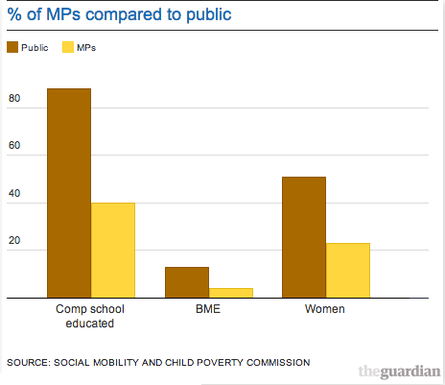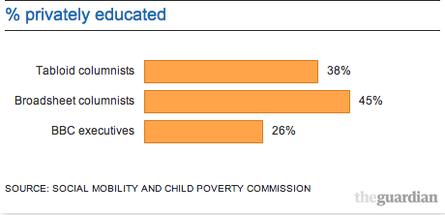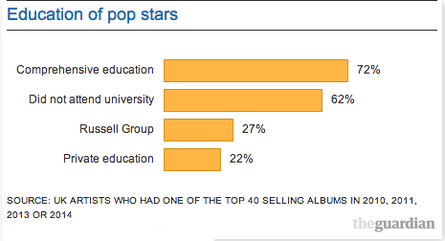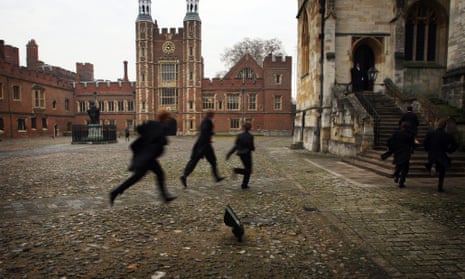Britain is “deeply elitist” according to a report by the government’s Social Mobility and Child Poverty commission, with people educated at public school and Oxbridge creating a “closed shop at the top”.
Andrew Sparrow writes today:
The Social Mobility and Child Poverty Commission said its study of the social background of those “running Britain” was the most detailed of its kind ever undertaken and showed that elitism was so embedded in Britain “that it could be called ‘social engineering’”.
The report shows that in many of the UK’s top professions there is a hugely disproportionate proportion of privately educated people compared to the general profile of the UK population.
Just 7% of the UK public attended private school, which compares to 71% of senior judges, 62% of senior armed forces officers, 55% of Whitehall permanent secretaries and 50% of members of the House of Lords.
The rate is also disproportionately high in other influential roles: 44% of people on the Sunday Times Rich List, 43% of newspaper columnists and 26% of BBC executives were all educated privately.
Just one in 100 members of the UK public was educated at Oxbridge, however graduates from those two universities make up 75% of senior judges, 59% of cabinet posts, 57% of permanent secretaries, 50% of diplomatics, 47% of newspaper columnists, 44% of public body chairs and 33% of BBC executives.
One in four MPs is an Oxbridge graduate as well as 12% of those on the Sunday Times Rich List.
Politics: our representatives are not representative
We have written before about how MPs are failing to accurately represent the ethnic minorities in their constituencies and that is not the only demographic where this is the case.
A third of MPs went to private school and 25% were educated at Oxbridge, which compares to 7% and 1% of the general public respectively. While 88% of the UK public went to a comprehensive, the same can be said for just 40% of MPs.
Although this sort of elite education was not evenly shared across parties - 59% of Labour MPs went to a comp, compared to 30% of Lib Dems and 26% of Conservatives.

The gap when it comes to women is similarly severe: while 51% of the public is female, only 23% of MPs are too.
The figures for the House of Lords show that 50% of its members are privately educated and just 12% went to a comprehensive school. Three in five (61%) of Lords come from just 24 universities.
Media: does it really speak for everyone in the UK?
Since 1986 the proportion of the top 100 media professionals (as judged by the Sutton Trust) that went to independent school has increased from 47% to 54%.
In that time it has also become a profession increasingly dominated by university graduates with 90% having attended compared to 78% in 1986.

BBC executives, tabloid columnists and broadsheet columnists are all much more likely to be privately educated than the general population. Just under half (45%) of those writing columns for broadsheets were educated at an independent school.
Judges, the armed-forces and police chiefs
The report singles out the UK judiciary as the most elitist profession in the UK and, as we have noted, 71% of them were students at an independent school. One in seven (14%) was educated at one of just five schools: Eton, Westminster, Radley, Charterhouse and St Paul’s Boys.
Second only to judges were senior armed forces officers, 62% of whom were privately educated while 30% went to a grammar school.
A more representative spread is seen in Police and Crime Commissioners (PCCs) and Chief Constables with a much smaller 22% privately educated but this is still three times the proportion of the UK public.
Pop stars and footballers: both more likely to have been independently educated than the general public
Pop stars are much more socially diverse than many of the other professions we have been talking about. For example, of the UK artists who had one of the top 40 selling albums in 2010, 2011, 2013 or 2014, 72% were educated at a comprehensive and 62% did not attend a university at all.

However, 22% of these musicians were privately educated - a higher proportion than university vice-chancellors (20%).
Although football at its highest level seems to be a far more representative sport than rugby or cricket, 13% of the England national football team were privately educated which is double the proportion of the UK public.
The future: the problem is getting better but not very fast
The report pulls out some of the following facts that bode quite badly for if the UK wants to shake off this elitism:
- 65% of doctors in training have at least one parent with a degree, a third were privately educated and just 6% grew up in the most deprived areas of the UK
- In 2012, only 25 new recruits to the Civil Service Fast Stream out of more than 600 were from working-class backgrounds
- Two thirds of new entrants to journalism still come from managerial and professional backgrounds; they are more than twice as likely to do so as the rest of the population
- 83% of new entrants into journalism do internships, which are on average for seven weeks and 92% of these are unpaid: this might be freezing out those from less advantaged backgrounds
The conclusion to all that: the UK is going to have to make some big changes if it ever hopes to be a socially mobile society.
Download the data
DATA: Download the spreadsheet
More open data
Data journalism and data visualisations from the Guardian
Development and aid data
Search the world’s global development data with our gateway
Can you do more with this data?
Contact us at data@theguardian.com

Comments (…)
Sign in or create your Guardian account to join the discussion